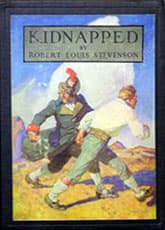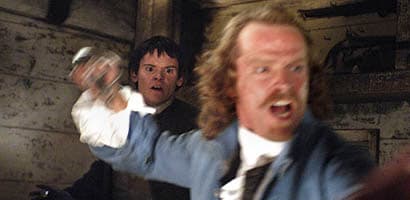Kidnapped
Critique • Quotes • At the movies
 1913 edition
1913 editionFirst publication
1886 in Young Folks magazine
First book publication
1886, England
Literature form
Novel
Genres
Literary, historical fiction, adventure, youth
Writing language
English
Author's country
England
Length
Approx. 88,000 words

Iain Glen is all action, swashing and buckling as the mercurial Alan Breck in 2005's Kidnapped.
Exciting escapades in the highlands of New Zealand
Kidnapped (2005): Television miniseries, three episodes, 50 minutes each; director Brendan Maher; writers Bev Doyle, Richard Kurti; featuring Iain Glen, James Anthony Pearson, Adrian Dunbar, Paul McGanny
The 2005 production of Kidnapped for Masterpiece Theatre was long anticipated and did not disappoint—except perhaps for those purists who couldn't get over Stevenson's tale being revised to make a better movie experience. For most of us though, it was done so well that it is difficult to think back to the novel to remember what's different.
The beautiful cinematography is actually of New Zealand substituting for Scotland. But somehow, despite the lack of heather, these hills feel more like the Highlands than some films shot in the UK.
Also, the story is shot excitingly in a modern style with moving cameras, but without sacrificing any of the classic content of Robert Louis Stevenson's story. There's a lot of running all over the hills, for example, giving the film a sort of Lord of the Rings feel—not surprising, given that the hobbit saga was also shot in New Zealand.
Most of the actors are themselves Celtic, which helps. Veteran Irish thespian Adrian Dunbar plays both Davie's dying father and the uncle who cheats the lad out of his rightful inheritance.
Iain Glen is magnetic as the mercurial, flamboyant rebel Alan Breck—more dashing even than Michael Caine in the 1971 adaptation. And brought even lower.
He starts as a larger-than-life character brandishing a sword and swashing a buckle with the best of them. But this Breck's romanticism is fraying at the edges. His heroic stature is chipped away by treachery and the revelation of his own human frailties. What seemed contradictory and confusing in the novel are in Glen's flesh made whole and human. The performance is so strong it turns Kidnapped into Breck's story, rather than Balfour's. Satisfyingly though, Breck is redeemed in the end through some movie-style heroics not found in the book's narrative.
Throughout the highland escapades, Breck and Balfour are hunted on behalf of the British by a scary bunch of mercenaries called the Long Mile Gang. I can't remember if they were in the book, but with their skinheads, black coats and cutthroat methods they add an element of contemporary horror that makes the historical tale seem more immediate in this film. (Again I am reminded of The Lord of the Rings—the dark riders that hunted down the heroes, though the Long Mile Gang do it all on foot.)
But this story, presented over two and a half hours, is more emotionally complex than can be indicated here, going way beyond the adventure of a kidnapped lad.
Perhaps not Robert Louis Stevenson's novel, but very much in its spirit and perhaps as he would have written it today.
— Eric

